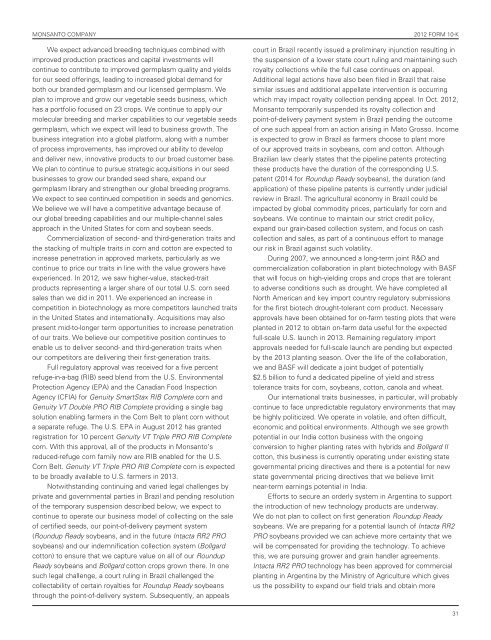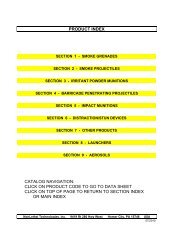monsanto-2012-annual-report
monsanto-2012-annual-report
monsanto-2012-annual-report
You also want an ePaper? Increase the reach of your titles
YUMPU automatically turns print PDFs into web optimized ePapers that Google loves.
MONSANTO COMPANY <strong>2012</strong> FORM 10-K<br />
We expect advanced breeding techniques combined with<br />
improved production practices and capital investments will<br />
continue to contribute to improved germplasm quality and yields<br />
for our seed offerings, leading to increased global demand for<br />
both our branded germplasm and our licensed germplasm. We<br />
plan to improve and grow our vegetable seeds business, which<br />
has a portfolio focused on 23 crops. We continue to apply our<br />
molecular breeding and marker capabilities to our vegetable seeds<br />
germplasm, which we expect will lead to business growth. The<br />
business integration into a global platform, along with a number<br />
of process improvements, has improved our ability to develop<br />
and deliver new, innovative products to our broad customer base.<br />
We plan to continue to pursue strategic acquisitions in our seed<br />
businesses to grow our branded seed share, expand our<br />
germplasm library and strengthen our global breeding programs.<br />
We expect to see continued competition in seeds and genomics.<br />
We believe we will have a competitive advantage because of<br />
our global breeding capabilities and our multiple-channel sales<br />
approach in the United States for corn and soybean seeds.<br />
Commercialization of second- and third-generation traits and<br />
the stacking of multiple traits in corn and cotton are expected to<br />
increase penetration in approved markets, particularly as we<br />
continue to price our traits in line with the value growers have<br />
experienced. In <strong>2012</strong>, we saw higher-value, stacked-trait<br />
products representing a larger share of our total U.S. corn seed<br />
sales than we did in 2011. We experienced an increase in<br />
competition in biotechnology as more competitors launched traits<br />
in the United States and internationally. Acquisitions may also<br />
present mid-to-longer term opportunities to increase penetration<br />
of our traits. We believe our competitive position continues to<br />
enable us to deliver second- and third-generation traits when<br />
our competitors are delivering their first-generation traits.<br />
Full regulatory approval was received for a five percent<br />
refuge-in-a-bag (RIB) seed blend from the U.S. Environmental<br />
Protection Agency (EPA) and the Canadian Food Inspection<br />
Agency (CFIA) for Genuity SmartStax RIB Complete corn and<br />
Genuity VT Double PRO RIB Complete providing a single bag<br />
solution enabling farmers in the Corn Belt to plant corn without<br />
a separate refuge. The U.S. EPA in August <strong>2012</strong> has granted<br />
registration for 10 percent Genuity VT Triple PRO RIB Complete<br />
corn. With this approval, all of the products in Monsanto’s<br />
reduced-refuge corn family now are RIB enabled for the U.S.<br />
Corn Belt. Genuity VT Triple PRO RIB Complete corn is expected<br />
to be broadly available to U.S. farmers in 2013.<br />
Notwithstanding continuing and varied legal challenges by<br />
private and governmental parties in Brazil and pending resolution<br />
of the temporary suspension described below, we expect to<br />
continue to operate our business model of collecting on the sale<br />
of certified seeds, our point-of-delivery payment system<br />
(Roundup Ready soybeans, and in the future Intacta RR2 PRO<br />
soybeans) and our indemnification collection system (Bollgard<br />
cotton) to ensure that we capture value on all of our Roundup<br />
Ready soybeans and Bollgard cotton crops grown there. In one<br />
such legal challenge, a court ruling in Brazil challenged the<br />
collectability of certain royalties for Roundup Ready soybeans<br />
through the point-of-delivery system. Subsequently, an appeals<br />
court in Brazil recently issued a preliminary injunction resulting in<br />
the suspension of a lower state court ruling and maintaining such<br />
royalty collections while the full case continues on appeal.<br />
Additional legal actions have also been filed in Brazil that raise<br />
similar issues and additional appellate intervention is occurring<br />
which may impact royalty collection pending appeal. In Oct. <strong>2012</strong>,<br />
Monsanto temporarily suspended its royalty collection and<br />
point-of-delivery payment system in Brazil pending the outcome<br />
of one such appeal from an action arising in Mato Grosso. Income<br />
is expected to grow in Brazil as farmers choose to plant more<br />
of our approved traits in soybeans, corn and cotton. Although<br />
Brazilian law clearly states that the pipeline patents protecting<br />
these products have the duration of the corresponding U.S.<br />
patent (2014 for Roundup Ready soybeans), the duration (and<br />
application) of these pipeline patents is currently under judicial<br />
review in Brazil. The agricultural economy in Brazil could be<br />
impacted by global commodity prices, particularly for corn and<br />
soybeans. We continue to maintain our strict credit policy,<br />
expand our grain-based collection system, and focus on cash<br />
collection and sales, as part of a continuous effort to manage<br />
our risk in Brazil against such volatility.<br />
During 2007, we announced a long-term joint R&D and<br />
commercialization collaboration in plant biotechnology with BASF<br />
that will focus on high-yielding crops and crops that are tolerant<br />
to adverse conditions such as drought. We have completed all<br />
North American and key import country regulatory submissions<br />
for the first biotech drought-tolerant corn product. Necessary<br />
approvals have been obtained for on-farm testing plots that were<br />
planted in <strong>2012</strong> to obtain on-farm data useful for the expected<br />
full-scale U.S. launch in 2013. Remaining regulatory import<br />
approvals needed for full-scale launch are pending but expected<br />
by the 2013 planting season. Over the life of the collaboration,<br />
we and BASF will dedicate a joint budget of potentially<br />
$2.5 billion to fund a dedicated pipeline of yield and stress<br />
tolerance traits for corn, soybeans, cotton, canola and wheat.<br />
Our international traits businesses, in particular, will probably<br />
continue to face unpredictable regulatory environments that may<br />
be highly politicized. We operate in volatile, and often difficult,<br />
economic and political environments. Although we see growth<br />
potential in our India cotton business with the ongoing<br />
conversion to higher planting rates with hybrids and Bollgard II<br />
cotton, this business is currently operating under existing state<br />
governmental pricing directives and there is a potential for new<br />
state governmental pricing directives that we believe limit<br />
near-term earnings potential in India.<br />
Efforts to secure an orderly system in Argentina to support<br />
the introduction of new technology products are underway.<br />
We do not plan to collect on first generation Roundup Ready<br />
soybeans. We are preparing for a potential launch of Intacta RR2<br />
PRO soybeans provided we can achieve more certainty that we<br />
will be compensated for providing the technology. To achieve<br />
this, we are pursuing grower and grain handler agreements.<br />
Intacta RR2 PRO technology has been approved for commercial<br />
planting in Argentina by the Ministry of Agriculture which gives<br />
us the possibility to expand our field trials and obtain more<br />
31





